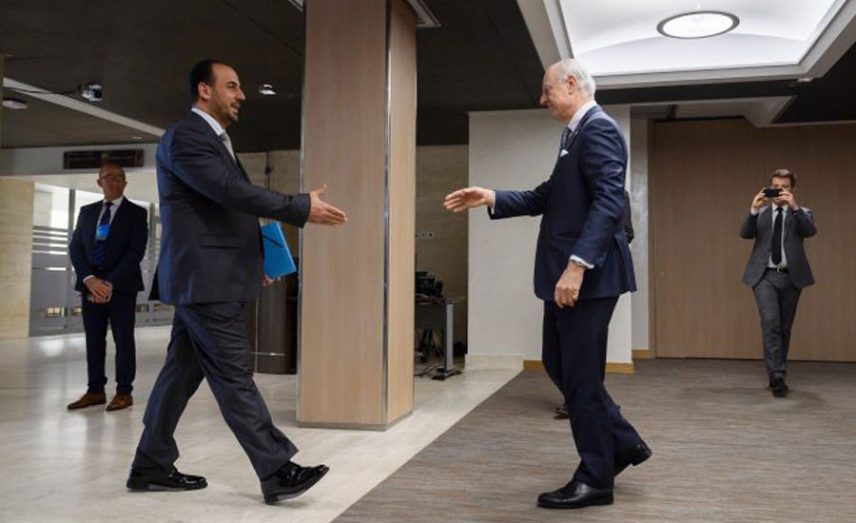Despite the expectation of “de-escalation zone” agreements in a number of Syrian regions, military clashes continue to take place in the center, east and southwest against the Islamic State (ISIS), or between opposition forces and the regime on the outskirts of the capital and the south of the country.
At the same time, pressure is increasing on the opposition Syrian National Coalition to pursue a “realistic” policy accepting the participation of the Cairo and Moscow platforms in the opposition delegation, which would lead to accepting President Bashar al-Assad remaining in place and not considering his departure a precondition for the transitional stage, as the opposition has pushed for.
Battles between the Syrian Democratic Forces and ISIS are continuing in a number of districts of the city of Raqqa, where these militias are waging the third month of fighting alongside air cover from the international coalition with the aim of capturing the city. The SDF recently announced it had taken control over new points south of Raqqa, and currently controls about 60 percent of the city.
In the meantime, regime forces violated the cease-fire agreement east of the capital Damascus minutes after it went into effect last Friday, bombarding a number of towns and wounding civilians, while also shelling the area between the Jobar district and the city of Zamlka and the town of Ayn Terma with surface-to-surface missiles.
The Al-Rahman Legion rebel group announced it had reached a deal with Russia leading to a cease-fire in the Damascus countryside's Eastern Ghouta. The group said in a statement that negotiations with representatives of the Russian side occurred in Geneva and lasted three days, and resulted in a cease-fire agreement in the Eastern Ghouta which also included the breaking of the siege.
Meanwhile, in Syria’s south, the Jaish al-Ahrar al-Ashair (Army of Free Tribes) announced a battle under the name “Restoring Dignity” to recapture positions which it recently withdrew from in favor of regime forces on the border with Jordan.
The group said in a video broadcast on its official YouTube channel that it had killed and captured a number of regime forces hours after announcing the battle in the Suweida desert, which aimed to recapture points and positions they had recently lost.
In Daraa province as well, the Khalid bin Walid Army, an ISIS-affiliated faction, appointed a new commander a day after the killing of its former commander Wael al-Eid (Abou Teem Enkhal) during a strike on the group’s position in the town of Al-Shajara in the Yarmouk basin.
Activists said that the new commander was Nader al-Dhiab (Abou Ali), who is from the town of Freekha in the Quneitra countryside. Opposition fighters captured him more than a year ago in the town of Heit Gharbi in western Daraa, and he remained in prison for six months before he was released as part of a prisoner exchange through which six opposition fighters were also released.
Pressure on the opposition
On the political level, meetings were held in the Saudi capital Riyadh between the delegation of the High Negotiations Committee and the Cairo and Moscow platforms with the aim of uniting the viewpoints of the Syrian opposition parties ahead of the coming Geneva negotiations.
These meetings come as the result of intense pressure from the U.N. envoy to Syria Staffan de Mistura, with the aim of pushing the Syrian opposition to deal “realistically” with the political developments produced by Russia’s dominance of the Syrian issue, a result of the continued absence of America and its regional retreat, except with regards to the fight against ISIS. Meanwhile, Turkey has come to focus on achieving its national interests, while the Gulf countries are preoccupied with their own crisis, with evidence emerging of Saudi Arabia pivoting toward a “realistic solution” which has been adopted by some international powers and promoted by de Mistura.
Sources in the High Negotiations Committee revealed that the bloc had formed a team for talks with the Cairo and Moscow platforms, which includes George Sabra, Ahmed al-Asrawi, Riad Nassan Agha, Hassan Ibrahim, Mohamad Abdel Qader Mustafa, Abdul Hakim Bashar and Mohamad Hejazi, in cooperation with the secretary-general of the High Negotiations Committee, Safwan Akkash.
In parallel, it appears that within the framework of pressuring the opposition, de Mistura announced the delay of technical negotiations with the Syrian opposition which were scheduled for this month, and said in a Geneva press conference that the suspension would provide an important opportunity for the opposition to reorganize their ranks, as it needed some time to arrive at a comprehensive approach, noting that “serious discussions will be held between the High Negotiations Committee and the Cairo and Moscow groups.”
Observers believe the weakness of the countries backing the revolution and the difference in their agendas is to blame for Russia's intervention in Syria and its undeclared authorization from Washington to preserve the Assad regime, which was then helped by the Gulf dispute — with the entry of key opposition backers Qatar and Turkey — which put the political opposition in its worst days.
This article was translated and edited by The Syrian Observer. Responsibility for the information and views set out in this article lies entirely with the author.


